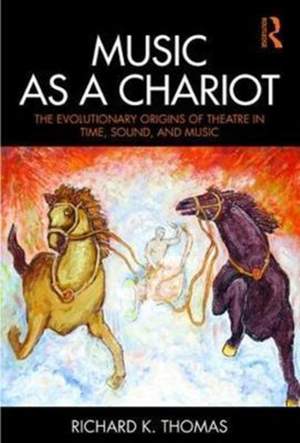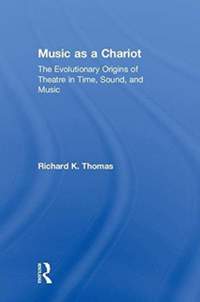Music as a Chariot: The Evolutionary Origins of Theatre in Time, Sound, and Music
- Author: Thomas, R P
Book
$52.00Contents
- Table of Contents
- Chapter 1: Introduction: Why this Book?
- Introduction: An Ear Opening Experience
- Old School Aesthetics
- When Sound Gets Divorced from Music
- Who Should Read this Book
- Overview of the Book
- Bibliography
- Ten Questions
- Things to Share
- Notes
- Part I: The Nature of Time
- Chapter 2: Let There Be a Big Bang
- Introduction: If a Tree Falls in the Universe...
- The Nature of Light and Sound
- The Evolution of Hearing and Speaking
- The Evolution of the Brain Leads to the Ability to Express Emotions
- Eyes and Ears, Space and Time
- Ten Questions
- Things to Share
- Notes
- Bibliography
- Chapter 3: The Great Mystery of Time
- Introduction: Babbling in Babelsberg
- The Mammalian Invasion
- We Are Such Stuff as Dreams Are Made of...
- The Relativity of Time
- Ten Questions
- Things to Share
- Notes
- Bibliography
- Part II: Music = Time Manipulated
- Chapter 4: What Is Music?
- Introduction: What's in a Name?
- Music Is Organized Sound
- Narrowing Our Definition of Music
- Music Is Visual as Well as Audible
- The Elements of Design
- Energy Characteristics
- Temporal Characteristics
- Spatial Characteristics
- Complex Elements that Combine Energy in Time and Space
- The Importance of These Elements of Music
- A Proposed Definition of Music
- Ten Questions
- Things to Share
- Notes
- Bibliography
- Chapter 5: Primate Numbers
- Introduction: Who's on First?
- Music, Language and Mimesis: The Really Early Years
- Bipedal Primates
- Ten Questions
- Things to Share
- Notes
- Bibliography
- Part III: Song = Music + Idea
- Chapter 6: Campfire Songs (Rhythm and Entrainment)
- Introduction: Welcome Homo
- One Giant Leap for Mankind
- Early Homo
- Homo Erectus
- Running, Tempo, Pulse, Tactus and Entrainment
- Tempo, Pacing, Tactus, Entrainment and Theatre Composition
- When Music Meets Mimesis
- Conclusion
- Ten Questions
- Things to Share
- Notes
- Bibliography
- Chapter 7: Music and Language
- Introduction: "All Theatre Starts with a Script"
- Brain Gains
- Fantastic Voyage
- Conclusion: Song = Music + Idea
- Ten Questions
- Things to Share
- Notes
- Bibliography
- Chapter 8: Consonance and Dissonance (The Evolution of Line)
- Introduction: The Roots of Who We Become
- The Evolution of Line
- Consonance and Dissonance
- What is Consonance and Dissonance?
- Subcortical Consonance and Dissonance Perception
- Cortical Consonance and Dissonance Perception
- Consonance and Dissonance in Theatre
- Line/Melody
- Harmony
- Conclusion: Consonance and Dissonance and Time
- Ten Questions
- Things to Share
- Notes
- Bibliography
- Part IV: Theatre = Song + Mimesis
- Chapter 9: Ritual, Arousal, Reward, Ecstasy
- Introduction: From High Mass to Ecstasy
- The Development of Ritual, Shamanism, and (Altered States of Consciousness)
- The Neuroscience of Arousal and Reward in the Altered States of Consciousness of Shamanism and Theatre
- Introduction: Dreams, Altered States of Consciousness and Theatre
- The Basic Neuroscience of Arousal
- The Effect of Music on Physiological Systems
- The Effect of Music on Psychological Systems
- Cognitive Models for Music in Theatre
- Robert Thayer's Model of Psychological Moods
- Berlyne's Theory of Arousal in Aesthetics and Psychobiology
- Conclusion: Experiments in Ecstasy
- Ten Questions
- Things to Share
- Notes
- Bibliography
- Chapter 10: Music, Mimesis, Memory
- Introduction: Traveling Backwards in Time
- The New Stone Age
- Memory
- Introduction
- Sensory Memory
- Long Auditory Store/Short Term Memory/Working Memory
- Long-Term Memory
- Creating and Retrieving Long-Term Memories
- Implicit Memory
- Explicit Episodic Memory
- Involuntary Explicit Episodic Memory
- Autobiographical Memory
- Conclusion: The Origins of Theatre and the Problems of the Oral Tradition
- Ten Questions
- Things to Share
- Notes
- Bibliography
- Chapter 11: The Bronze Age and the Invention of Writing
- Introduction: Theatre Becomes Drama
- The Bronze Age
- The Emergence of Written Language
- The Transition from Oral Tradition to Recorded History
- Conclusion: Lost in Translation?
- Ten Questions
- Things to Share
- Notes
- Bibliography
- Chapter 12: Conclusion: Evolution and Greek Theatre
- Introduction: A Case Study
- The Origins of Greek Music: Music = Time Manipulated
- The Development of Greek Song: Song = Music + Idea
- Music as Math Made Audible: The Greeks Revisit Consonance and Dissonance
- The First Autocratic Theatre: Theatre = Song + Mimesis
- Plato and His World
- Aristotle's Theatre
- Conclusion of the Conclusion
- Eleven Questions, Part I
- Eleven Questions, Part II
- Things to Share
- Notes
- Bibliography




